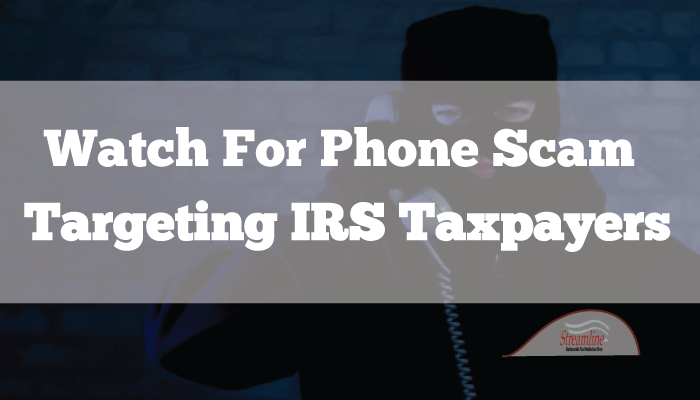Craig Thomas
Latest posts by Craig Thomas (see all)
- Chris Feels Victorious - September 8, 2016
- Are You At Risk of a Levy? - May 26, 2016
- 3 Ways To Survive Your Spouse’s Tax Troubles - February 15, 2016

As an on going effort, I will continue to provide you the most recent information on identity theft. The focus here is how it relates to IRS security.
Ok, here’s the scoop –
Scammers now have the capability to alter what appears on your telephone caller ID to make it seem like they are with the IRS, or another agency such as the Department of Motor Vehicles. They use fake names, titles and badge numbers. They use online resources to get your name, address and other details about your life to make the call sound official. They even go as far as copying official IRS letterhead for use in email or regular mail. The latest con is that they’ll call and state that you will be sued if you don’t pay. Note to self: the IRS does not sue for back taxes.
The goal of these criminals is to scare people into reacting immediately without taking a moment to think through what is actually happening. Before they realize they’re being deceived, the victim is forking over their hard earned dollars into the scammer’s shady hands via a variety of creative payment methods.
For example, scammers will provide their victims with directions to the nearest bank, or business where the victim can obtain a means of payment, such as a debit card. And in another new variation of these scams, con artists may then provide an actual IRS address where the victim can mail a receipt for the payment — all in an attempt to make the scheme look official
Targets
Scammers posing as IRS agents first target those they view as most vulnerable, such as older Americans, newly arrived immigrants, and those whose first language is not English. These criminals have expanded their net and are now targeting virtually anyone.
Here are just a few tips to alert you to things the IRS will never do:
- Call to demand immediate payment, nor will the agency call about taxes owed without first having mailed you a bill.
- Demand that you pay taxes without giving you the opportunity to question or appeal the amount they say you owe.
- Require you to use a specific payment method for your taxes, such as a prepaid debit card.
- Ask for credit or debit card numbers over the phone.
- Threaten to bring in local police or other law enforcement groups to have you arrested for not paying.
Call the IRS at 1-800-829-1040 to report any suspicious communications allegedly from the IRS.
If you are in need of help with resolving an IRS fraud issue, or if you are struggling with a tax debt – feel free to contact me to discuss your options. It’s free!






